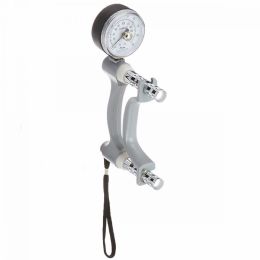
A dynamometer, also known as a pinch gauge, is a hand-held medical device that is used for measuring a patient’s hand strength to initially evaluate a patient’s hand dysfunction or trauma, and also to determine how a patient is responding to ongoing therapy and treatment. This device is utilized for clinical decision making and outcome evaluation on pathologies such as carpal tunnel syndrome, tendon injuries of the hand, nerve injury and neuromuscular disorders.

Who Uses Dynamometers?
Dynamometers are used to assess strength in routine screenings, and to initially evaluate patients with hand dysfunction or trauma. These medical devices can help practitioners to determine how their patients are responding to ongoing therapy and treatment. Dynamometers are often utilized to measure grip strength in cases where cervical nerve roots may be compromised, or with suspected peripheral nerve damage. Medical uses include functional capacity evaluation, muscle strength comparison and analysis, and rehabilitation.
In occupational therapy, kinesiology and other ergonomic health approaches, dynamometers help practitioners to measure grip, arm, back and/or leg strength of their patients to evaluate physical performance, status and task demands. These force dynamometers typically work by measuring the force applied to a lever or through a cable, and the 'moment of force' is determined by multiplying the perpendicular distance from the force to the axis of the level.
What Kind of Dynamometer is Right for Me?
A varied assortment of dynamometers with specific testing goals implemented in their design are available for a broad range of medical, rehab and therapy applications. Within this vast array, there are four basic dynamometer types used primarily in the healthcare fields: hydraulic gauge, pneumatic, Myogrip strain gauge and push-pull.
Hydraulic Gauge Dynamometer
As one of the most commonly used types of dynamometers, a JAMAR hydraulic grip dynamometer generally features a curved plastic or metal grip that the patients holds and squeezes. Considered to be one of the most accurate and reliable dynamometers in the industry, this model works with a hydraulic mechanism that measures the pressure exerted by the patient's grip, and then displays this information with a gauge or digital display.
Pneumatic Dynamometer
Utilizing a rubber squeeze ball on the end of a tube, pneumatic dynamometers require the patient to squeeze the ball and this force is measured by a gauge at the other end of the tube. Some pneumatic dynamometers also highlight a digital display. The Martin vigorimeter is one of the most commonly used pneumatic dynamometers in the healthcare fields, offering precise accuracy and ease of use for many different types of applications.
Myogrip/Strain Gauge Dynamometer
Smaller in size than the JAMAR or Martin dynamometers, the Myogrip, or strain gauge dynamometer is more sensitive and specifically designed to measure grip strength for patients who are weak, frail and present a lighter grip. This newer design often highlights digital displays and the utmost in precision, accuracy and sensitivity, especially ideal for patients with various neuromuscular disorders.
Push-Pull Dynamometer
This type of dynamometer measures exerted force through pushing or pulling, often using static/isometric and dynamic forces. Simple and easy to use, this device can be utilized for manual muscle testing, job task evaluation and functional capacity assessment by effectively measuring lift, push and pull forces.
Whatever dynamometer you decide on, most of these devices will measure grip strength up to 200 pounds, and each dynamometer typically offers a lot of versatility to perform a variety of testing functions. Other types of dynamometers Rehabmart offers include a back-leg-chest device to measure strength in those particular body areas, a wrist and forearm dynamometer to determine strength of the wrist muscles during adduction, abduction, flexion and extension along with forearm muscles during pronation and supination, and finger pinch gauges to specifically determine tip pinch, three-point and lateral strength.
Rehabmart offers a vast array of various hand dynamometers from superior quality manufacturers that include Fabrication Enterprises, North Coast Medical and Chattanooga Medical Supply.
Hulet Smith, OT
Rehabmart Co-Founder & CEO
ck